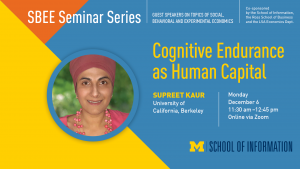Presented By: Department of Economics
Social, Behavioral and Experimental Economics (SBEE) Seminar: Cognitive Endurance as Human Capital
Supreet Kaur, University of California, Berkeley

Abstract:
We examine the possibility that schooling may build human capital not only by teaching academic content, but by expanding the mind's capacity for cognition itself. We hypothesize that one feature of formal schooling---engaging in effortful thinking for sustained periods---could increase sustained attention: the ability to maintain focus over time. To motivate this idea, we document that globally and in the US, the poor exhibit worse sustained attention than the rich across a variety of field behaviors; they also attend schools that are less likely to require them to engage in concentration. We test our hypothesis using a field experiment with 1,650 low-income Indian primary school students. We assign students to engage in cognitive activity for sustained periods during the school day, using either math content (mimicking good schooling) or non-academic content (providing a pure test of our mechanism). Each approach markedly improves sustained attention across disparate domains: academics, listening, IQ tests, and traditional psychology measures. Moreover, the treatments increase students' regular school performance in Hindi, English, and math. This indicates that simply spending time in effortful thinking---without learning any subject content---substantively improves traditional measures of human capital. Our findings support a broader view of how schooling shapes general human capital, and suggest that worse environments may disadvantage poor children by hampering the development of core cognitive capacity.
We examine the possibility that schooling may build human capital not only by teaching academic content, but by expanding the mind's capacity for cognition itself. We hypothesize that one feature of formal schooling---engaging in effortful thinking for sustained periods---could increase sustained attention: the ability to maintain focus over time. To motivate this idea, we document that globally and in the US, the poor exhibit worse sustained attention than the rich across a variety of field behaviors; they also attend schools that are less likely to require them to engage in concentration. We test our hypothesis using a field experiment with 1,650 low-income Indian primary school students. We assign students to engage in cognitive activity for sustained periods during the school day, using either math content (mimicking good schooling) or non-academic content (providing a pure test of our mechanism). Each approach markedly improves sustained attention across disparate domains: academics, listening, IQ tests, and traditional psychology measures. Moreover, the treatments increase students' regular school performance in Hindi, English, and math. This indicates that simply spending time in effortful thinking---without learning any subject content---substantively improves traditional measures of human capital. Our findings support a broader view of how schooling shapes general human capital, and suggest that worse environments may disadvantage poor children by hampering the development of core cognitive capacity.